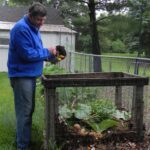Like millions of Americans who live in rural or semi-rural areas we don’t have access to a city sewer and rely on our septic tank to safely dispose of waste. We’re lucky at Winding Pathways. Our home is built on an ancient sand dune with steep topography. It’s perfect for a septic system.

We put scraps that chickens will not eat into the compost bin.
As a review, we’ve been spared septic tank problems because we treat our system carefully. Here’s what we do:
- Only human and sink waste goes down the drain. Potato peels, apple cores, and all other food waste go either to our chickens or into the compost bin. Spring and fall, we work the compost into the garden soil.
- Have our tank pumped every three or four years.
- Avoid draining harsh chemicals, like bleach and solvents, into the tank.
- Use water-efficient toilets, showerheads, and sink aerators to limit the amount of water going into the tank.
In August 2019, we blogged in detail about maintaining a septic system. Since then, many readers have come to that blog. Especially this winter. So, we are curious.
What brings you to Winding Pathways? What topics interest you most? Why? What else would you like to read about?
Thanks for keeping us company on Winding Pathways and happy reading as winter winds down and spring manifests itself across the Northern Hemisphere.

